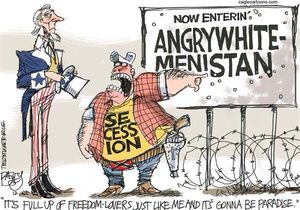
I live in Techland, and have lived here most of my life. I am a modest citizen in the place, but to other Americans I’m doing quite well.
I have watched technology roll over the industrial economy, and now the suburban economy, like an invasive species. Technology destroys long-standing power relationships. It eliminates friction in the economy, and that’s a good thing, but in doing that it eliminates the jobs, and power, of the people who created the friction.
Those people who create that friction are the nobility in Trumpistan. A lot of analysts talk about Trumpistanis as being blue collar, poorly educated, and ignorant. Some are. But what has made Trump a political force is his support from golfers. Men (and they’re mostly men) who make deals on golf courses because they can, are at the heart of Trump’s support in the business community.
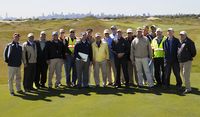
Techland doesn’t play golf. Techland rides bikes.
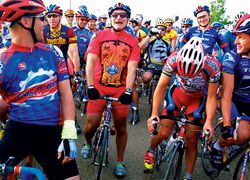
Bicycling, as an individual sport, is a way of forgetting, and re-setting. It’s a ctrl-alt-delete sport. Bicycling, in a group, turns individuals into a team. You go back to pace a rider who is having trouble, or you race for the front but don’t go too far ahead, lest the peloton swallow you up. It’s a good analogy for how code is written. It’s about a team pounding out a pace.
Moore’s Law has two sides to it.
One side is the freedom that technology gives to masses of individuals implied by Moore’s Law itself, which I have described as “better and better gets faster and faster.”
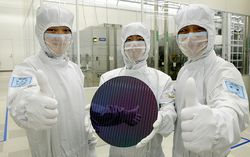
The same sort of thing has been happening in other areas of technology. It’s a concentration of power, described in the map I linked to last week comparing the economic power of counties against the geography of the country. What that picture does not show, unless you look closely, is how that even the concentrations have concentrations.
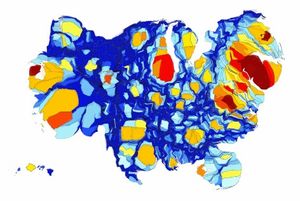
Cities are a lighter shade of blue than the countryside – Phoenix is light blue, and so is most of Florida. Las Vegas is blue, and so are Birmingham and Boise. But most of the countryside is a very dark, almost eerie blue. The main economic activity in these places is tourism. This is where Techland goes when they want to get away from it all. The main economic activity in these places is serving the strange, increasingly high-end needs and desires of Techland’s winners.
If you look closely, this is also a political map. Techland is Democratic, Trumpistan is Republican. The desperation that Trump represents is the blue on this map being completely subsumed under tech. You don’t need the local bank, you can go to Lending Club. You don’t need the local insurance agent. You can go to Progressive.com. You can find the real price of real estate on Zillow, avoid the local car dealer with Carmax.
The power of the gatekeepers, the golf buddies who once at least had power within their ordered suburbs, exurbs, and rural communities, has been broken by clouds and apps during this decade. The Republican Party, which represents what are now mainly economic losers, is looking for a winner, even a pretend winner, and Donald Trump fits the bill.
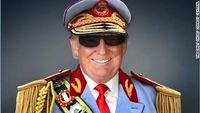
In the powerless world of Trumpistan, this kind of profoundly inchoate anger is very appealing, and we miss the point if we only call it ignorance, or racism, if we call it bigotry or “the stupid.” At the heart of it is fear. Not just social fear. Not just political fear. Mainly it’s an economic fear, a fear shared by people with white and blue collars alike, a fear of being absorbed into a technology world that looks like a black hole to them.
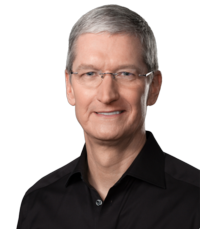
But winning means more. Winning doesn’t just mean some Americans win. It means we all win. And right now most of us are losing, because most of us don’t live in Techland.
A lot of this uncertainty can be seen in the issue of Apple and encryption. It’s a classic battle of East Coast Law vs. West Coast Law. As Tim Cook notes, you can’t regulate math. If you demand this type of encryption be broken, then new encryption will arise which you can’t break. It’s an arms race, and demands that Apple break into its own products only accelerates that arms race.
You can explain this rationally all you want. Or you can just pound your fist and demand that encryption be broken, because terrorism. Or because, child porn. Or because, drugs. Or because, crime. Or because, you’re scared.
Trumpistanis are scared of this new Techland, this 21st century world where magic is always just around the corner, ready to throw us out of jobs, careers, and power relationships they’ve worked a lifetime to create.
And so the issues of 2016 are joined.










Techland also adversely affects family. I’d prefer my children call/visit as human beings verses interacting with them via Facebook, texting, email (The Cyber Family). I started in the tech business in 1967 and have always been aware of techs destructiveness as well as its advantages.
Techland also adversely affects family. I’d prefer my children call/visit as human beings verses interacting with them via Facebook, texting, email (The Cyber Family). I started in the tech business in 1967 and have always been aware of techs destructiveness as well as its advantages.
Happy after reading this
Happy after reading this